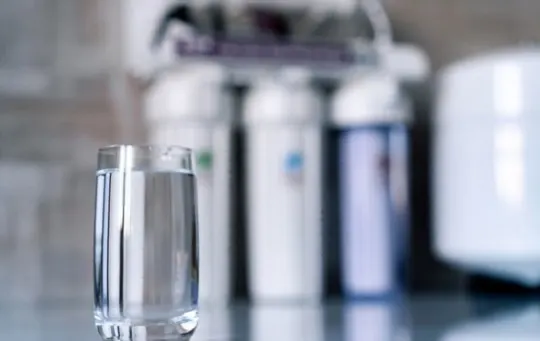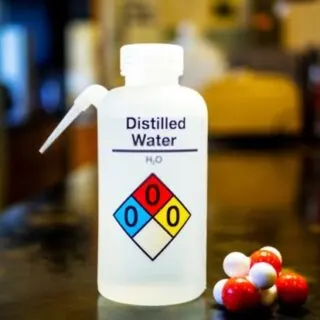Have you ever taken a sip of distilled water and asked yourself, “what does this even taste like?”
Distilled water is now more accessible than ever with bottled varieties found in most supermarkets, but its unique taste profile can be hard to pin down.
To help answer your questions about what distilled water tastes like and why it might appeal (or not) to you, we’ve curated this comprehensive guide that covers everything from the flavor notes detected by professionals to convenient servings suggestions if you choose to incorporate it into your diet.
So read on — as we dive deep into all things related to the taste of distilled waters!
What is Distilled Water?

Distilled water has become an increasingly trending topic in the world, especially in the health industry.
But what is distilled water, and how is it different from other types of water? Simply put, distilled water is water that has undergone the process of distillation, where impurities and minerals are removed from the water through boiling and condensing.
The result is a pure form of H20 that is free from any contaminants or pollutants.
The distillation process is so effective that it removes nearly all of the impurities present in most other types of water.
The benefits of drinking distilled water are numerous, such as detoxification and hydration, and it is an excellent option for people who want to avoid the harmful effects of contaminants in tap water or other bottled waters.
So, if you’re looking for a safe, pure, and beneficial source of hydration, distilled water is the way to go.
Why Does Distilled Water Have No Taste?

Distilled water doesn’t have any taste because it’s pure water with all the minerals and impurities removed through the distillation process.
In simple terms, this process involves boiling water to produce steam, which is then condensed back into liquid form, leaving behind all the impurities.
Distilled water is often used in laboratories, medical facilities, and industrial settings where the purity of the water is critical.
Distilled water is also suitable for drinking, but some people find it tasteless or flat due to the lack of minerals that are present in other types of water.
While distilled water may not have a taste, it has many benefits, including its purity, lack of contaminants, and lower risk of mineral buildup in appliances.
If you’re looking for a tasteless, pure water source, distilled water is a great option.
How Does Distilled Water Compare to Other Types of Water?

Distilled water is created by a process of boiling water and collecting the steam, leaving behind any impurities and minerals present in the water.
The result is a pure form of water that is free from contaminants, heavy metals, and toxins that may be present in other types of water.
However, the distillation process also removes any beneficial minerals that may be present in the water, which are essential for good health.
As for the taste of distilled water, most people describe it as flat, bland, or tasteless, due to the absence of minerals and other substances that contribute to the flavor of other types of water.
Compared to other types of water, such as tap water, spring water, or mineral water, distilled water is highly purified, making it the safest option for drinking and cooking purposes.
However, it may not be the best option for long-term drinking, as the lack of minerals may have negative effects on your health.
Pro tip: Add a slice of lemon or other fruits to distilled water to enhance its taste and make it more enjoyable to drink.
1 – Tap Water
Distilled water is a type of purified water that has gone through a process of distillation to remove impurities and minerals.
The process involves boiling water into steam, followed by condensation of the steam into a clean container.
Unlike tap water, distilled water has no smell, taste, or mineral content, making it a popular choice for drinking, cooking, and scientific experiments.
However, while some people prefer the neutral and clean taste of distilled water, others find it tasteless or unnatural.
Pro tip: If you find the taste of distilled water unappealing, you can enhance it by adding a slice of lemon or lime or infusing it with your favorite fruits, herbs, or tea leaves for a refreshing and nutritious drink.
2 – Mineral Water
Distilled water is a type of purified water that has gone through a process of distillation to remove impurities such as minerals and contaminants.
The result is water that is free of chemicals, minerals, and other substances that can affect its taste and purity.
As distilled water is free from minerals, it has a flat and tasteless quality.
This is because minerals in water contribute to its flavor, and without them, the water tastes bland.
However, the lack of minerals can make it an excellent choice for certain applications, such as humidifiers, irons, and medical procedures where mineral buildup and impurities can be harmful.
Although distilled water is safe to drink, it is not recommended as the sole source of drinking water as it lacks essential minerals that are important to our bodies.
Therefore, it is essential to maintain a balance between drinking distilled water and water that contains essential minerals.
Pro tip: Distilled water is perfect for cleaning and can help you get a streak-free finish.
3 – Spring Water
Distilled water is a type of purified water that is created through the process of distillation, where water is boiled, converted into steam, and then cooled to form a liquid that is free of impurities.
Distilled water has a very plain taste due to the removal of all minerals and contaminants, leaving only hydrogen and oxygen molecules.
Some people find it refreshing and clean-tasting, while others find it bland or even unpleasant.
Distilled water can be used in a variety of applications, such as in laboratory experiments, medical treatments, and industrial processes.
It is also commonly used in household appliances like irons and humidifiers as it does not contain minerals that can cause buildup or damage.
However, it is not recommended for regular consumption as it lacks essential minerals that our bodies need.
Pro tip: If you prefer drinking distilled water, consider adding mineral drops to it to replenish the minerals lost during the distillation process.
Can You Drink Distilled Water?

Distilled water is safe to drink, although it may not be the best option for daily consumption due to its taste and lack of minerals.
Distilled water is a type of purified water that has gone through a process of distillation, which involves boiling water and collecting the steam as it condenses back into a liquid.
This process removes impurities such as minerals, metals, and bacteria from the water, making it pure and safe to drink.
However, because distilled water lacks minerals such as calcium, magnesium, and potassium, it can have a flat taste and may not be as refreshing as other types of water.
Additionally, some people prefer the taste of water with minerals.
Pro tip: If you choose to drink distilled water, it’s important to ensure that you’re also getting enough minerals and nutrients from other sources in your diet.
Conclusion
In conclusion, distilled water is water that has undergone a distillation process to remove impurities, minerals, and other contaminants.
The process involves boiling water until it turns into steam, which is then collected and condensed back into water.
This results in water that is free of any minerals or chemicals that may be harmful to human health, making it a safe choice for drinking and cooking purposes.
Whether you prefer distilled, tap, or mineral water, be sure to consume enough water to stay hydrated and healthy.

What Does Distilled Water Taste Like? A Comprehensive Guide
Ingredients
- Distilled Water
- Ingredients from your selected recipes
Instructions
- Select ingredients that work well together.
- Use a recipe or method that will enhance their natural taste.
- Taste and adjust the recipe as needed to achieve the desired flavor.

Carrie is a food writer and editor with more than 15 years of experience. She has worked for some of the biggest names in the food industry, including Bon Appétit, Food & Wine, and Martha Stewart Living.
As the Editor in Chief of IntroChicago.com, Carrie oversees all of the content on the site. She also manages the team of contributing writers and editors, who help to create delicious recipes, helpful tips, and informative articles that you’ll find on the site.
A native of the Chicago area, Carrie is passionate about all things food. She loves trying new restaurants and experimenting with new recipes in her kitchen. She’s also a graduate of the Culinary Institute of America, so she knows a thing or two about food!
